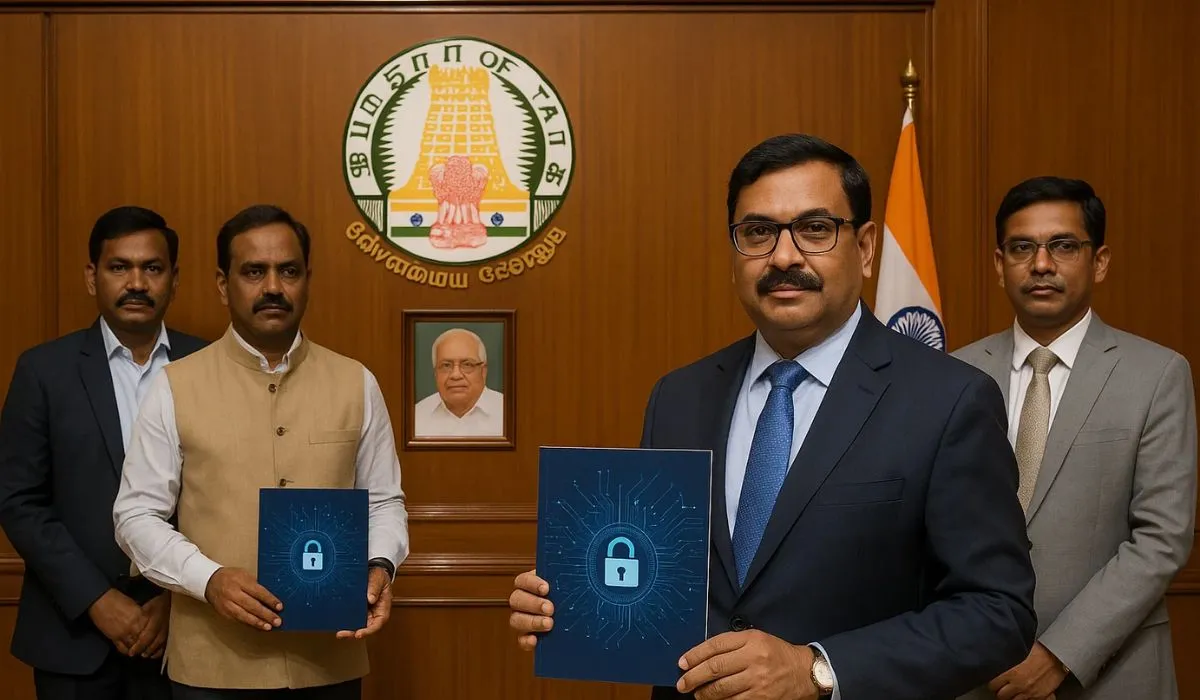Tamil Nadu has excelled in adopting digital technology. It is a leading state in India. The state is trying to excel. To secure the cyber ecosystem. With the launch of Cyber Security Policy 2.0. Cyber threats these days are increasing at a rapid pace. The updated framework will help reduce them. Both private and government institutions are dependent.
The goal of the state is to focus on data protection. Against cyber attacks and creating awareness. The state is trying to strengthen its position. As a safe and secure digital hub.
Why Cyber Security Policy Needed?
Cyber security has become more critical these days. The rise of online transactions. And cloud adoption, and governance. The state has recognized its first cyber security policy. We need this to meet challenges.
Read Also: Cybersecurity for E-Commerce Websites
Threats are becoming more complex. Cybercrime is at its peak. To keep the data of the citizens. A safe e-governance initiative requires strong protection. The IT producing and financial companies. Are relying on a digital base.
The state is aligning with global cyber security practices. So to attract investments. The design of Cyber Security Policy 2.0 responds to these needs. With stronger frameworks and forward-looking strategies.
Key Features of Tamil Nadu Cyber Security Policy 2.0

Prevention, detection, response, and recovery. Are the four pillars of the policy. We can see its core highlights:
1: Improving Government Systems
For all government apps and websites. We need mandatory security audits. Real time monitoring and fulfillment. Advanced firewalls will be there. Mandatory security audits for all government websites and apps. For digital governance, adopting cloud security frameworks.
2: Protecting Citizen Data.
For handling sensitive personal information, guidelines are there. Secure transfer and encrypted storage protocols exist. Citizens recognize the awareness programs to avoid cyber threats.
3: Building a skilled cyber security workforce
Institutions hold training programs for IT specialists. And even for government employees. In educational institutions, the formation of cyber labs. To promote partnerships. Be it in cyber security, research, or public and private ones.
4: Response to Cyber Incidents
For real-time analysis. A dedicated Cyber Security Operations Center. To handle the attacks; we align response systems that are swift. Persons and businesses use clear reporting mechanisms.
Benefits for Citizens
The everyday internet users are even protected. By the introduction of the policy. Not only are the government systems protected. They introduce safe banking and payments. Which will be a strong framework for the users. The information on Aadhaar health.
You Must Also Like: Everything You Need to Know About 5G Rollout in Assam
And we will secure the financial details. We will conduct awareness campaigns. To inform the people about the websites and the scams. Citizens will feel more secure. The government services have moved online as well.
Benefits for Businesses and Start-ups
The new policy provides direct support to businesses. Introduced by Tamil Nadu’s digital economy. We will remove the risk of data breach. The team has improved the data security. Both domestic and global investments.
They get attracted by the secure environment. Start-ups will innovate while ensuring safety. By the introduction of cyber security labs . And even incubation Centers. Companies in the state can align. With global cyber security frameworks and ISO.
Focus on Education and Skills Development
Cyber Security Policy 2.0 even recognizes. That technology is only as strong as the people who use it. The state plans to:
- Institutes will introduce cyber security courses. To handle cyber crime cases. They will conduct training for law enforcement.
- To strengthen defense mechanisms. We encourage ethical hacking programs. We would support huge cooperation . In cyber security challenges.
- This focus on education ensures. That Tamil Nadu builds a future-ready workforce. Capable of handling global cybersecurity challenges.
Challenges Coming Forward
The challenges remain, while the new policy is ambitious:
- We need significant funds to upgrade the framework. And even for usage. Inventors create new attack methods. Even the hackers work around the clock.
- Rural areas need more digital literacy. To reduce the risk . In both private and government sectors. We must synchronize cyber security efforts.
- The success of the policy depends. We will address these challenges in the coming years.
Tamil Nadu’s Vision for a Secure Digital Future
Tamil Nadu is aiming to secure a position. With the introduction of the security policy, 2.0:
For businesses and IT companies. A trusted digital hub is needed. New job events are supposed to be created for the youth. A training ground will be provided for cyber security talent.
This forward-looking vision ensures that as technology advances. The state remains secure, adaptable, and universally competitive.
Conclusion
The rollout of this policy shows that the state is fulfilling the commitments. It is about digital change. Trying to balance the needs of citizens' businesses. While preparing for future cyber challenges. As the district services expand, these policies. Ensuring that security remains the priority for the state.













